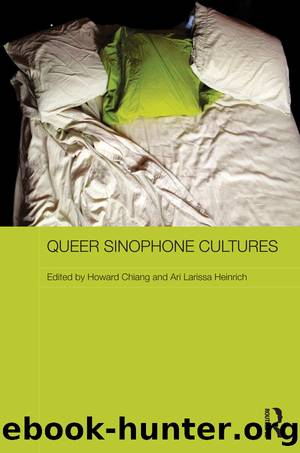Queer Sinophone Cultures by Howard Chiang Ari Larissa Heinrich

Author:Howard Chiang, Ari Larissa Heinrich [Howard Chiang, Ari Larissa Heinrich]
Language: eng
Format: epub
Tags: Nonfiction, Social & Cultural Studies, Social Science, Gender Studies, Lesbian, Gay Studies
ISBN: 9781135069773
Publisher: Taylor and Francis
Published: 2013-11-26T05:00:00+00:00
7
A queer journey home in Solos
Rethinking kinship in Sinophone Singapore
E.K. Tan
Solos (2007), a feature film co-directed by rising Singaporean directors Loo Zihan and Kan Lume, explores two sets of non-normative relationships: a sexual relationship between a student and his teacher, and a troubled relationship between the student and his depressed mother. The mundane and dialogue-less narrative of the film focuses on representing the emotional distance between the characters and their individual yearning for intimacy, both physical and emotional. In general, reception to the film centered on discussions of the taboo studentâteacher relationship, the filmâs gay theme, its explicit sex scenes, and its censorship issue in Singapore. This focus on controversial issues overlooked the significant narrative of the motherâson relationship in the film. As a result, this narrative thread in the film is pushed to the background.
To prevent the narrative from sinking into a transgressive one that dwells exclusively on the taboo subject of queer sexuality, or one that violates the piety of the family, this chapter attempts to establish a dialogue between the queer Singaporean identity and the kinship system through an active queer orientation: Solos suggests a rethinking of the relationship between queer identity and kinship in the Sinophone Singaporean society.1 Instead of conceiving queer identity as a problem to the unity of the family unit, resigning it to the fate of a kinship outcast, or advocating its autonomy from the hetero-normal family order, Solos recuperates the troubled relationship between queer subjects and their families by suggesting the queering of the kinship system for a negotiable space of inhabitance. Such queering, in the form of negotiation, offers practices that could engender diverse forms of kinship structure.
Solosâthe censorship controversy
Early March 2007, during an interview with the Business Times (Singapore), the Singapore International Film Festival director Philip Cheah shared his vision on the future of SIFF at this significant moment of its twentieth anniversaryâto stay relevant in a globalized world. To Cheah, in order for the SIFF to stay relevant to a globalized world means to prevent the local from being consumed by the overpowering globalization in order to uncover the importance of the roles played by âthe small, the intimate and the localâ in the larger space of global politics. In practice, this SIFF vision pledges the continuing pursuit of its founding agenda to nurture new talents, and borrowing Singapore Film Commission (SFC) director Man Shu Samâs words, to function as the window that âallows the film world outside to look into Singapore, and connects Singapore to film centres around the world.â The SIFFâs twentieth anniversary endorsed its founding agenda to promote the Singapore film industry by accepting fifty-three films in the Best Singapore Short category and showcasing eight features by local filmmakers, including Solos, which was also a nominee for the Best Silver Screen Award for Asian Feature.
The SIFFâs excitement and anticipation of this global and diverse vision that circumscribed its twentieth anniversary was soon clouded by the Board of Film Censorsâ (BFC) decision to cut scenes from two
Download
This site does not store any files on its server. We only index and link to content provided by other sites. Please contact the content providers to delete copyright contents if any and email us, we'll remove relevant links or contents immediately.
Sex Workers As Virtual Boyfriends by Joseph Itiel(216)
A Trans Man Walks Into a Gay Bar: A Journey of Self (And Sexual) Discovery by Harry Nicholas(195)
Despite All Adversities by Lema-Hincapié Andrés;Castillo Debra A.;(187)
A History of Women in Men's Clothes by Norena Shopland;(179)
Transgender Behind Prison Walls by Baker Sarah Jane Stockwell Pam(178)
One Marriage Under God by Melanie Heath(168)
Transgender Employees in the Workplace by Jennie Kermode(166)
Visions of Sodom by H. G. Cocks(161)
Substance Use Disorders in Lesbian, Gay, Bisexual, and Transgender Clients by Sandra Anderson(161)
Queer TV China by Zhao Jamie J.;(158)
Confronting Religious Denial of Gay Marriage by Wallace Catherine M.;(156)
Consumed by Desire (Central Park South Book 1) by Bianca Vix(155)
Lesbian Doms: 10 Women Describe Their Most Memorable Lesbian Domination Experience by Foster Kendra(155)
Who's Who in Contemporary Gay and Lesbian History Vol.2 by Robert Aldrich Garry Wotherspoon(149)
Lesbian Mothers by Ellen Lewin(145)
She and Her Pretty Friend by Danielle Scrimshaw(143)
Mobile Orientations by Nicola Mai(141)
My White Best Friend by Rachel De-lahay(140)
A Practical Guide to Searching LGBTQIA Historical Records by Norena Shopland(138)
